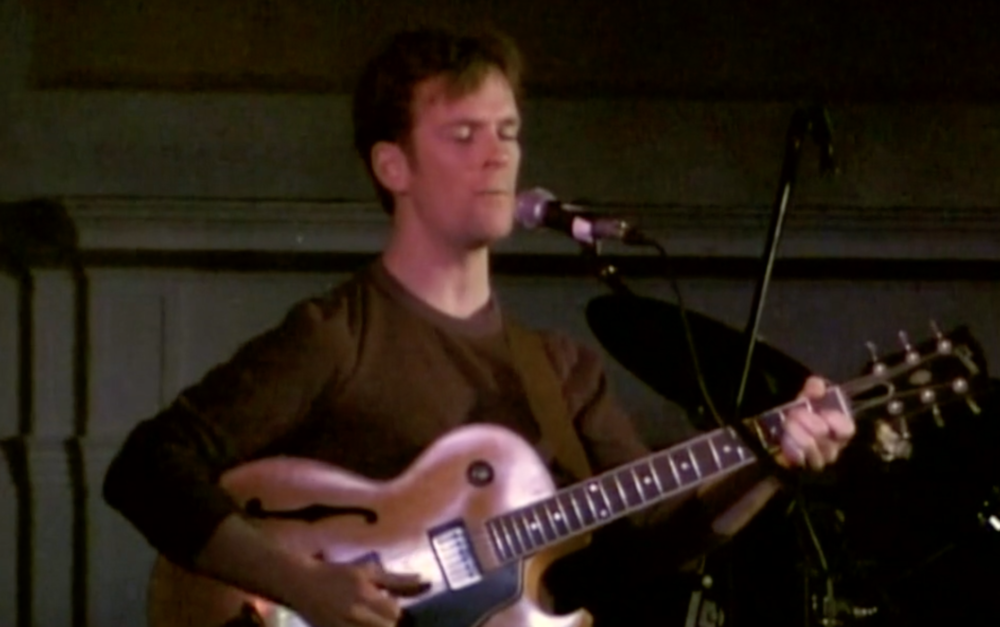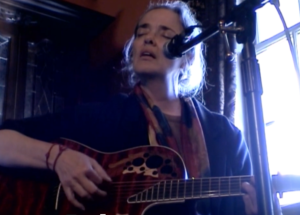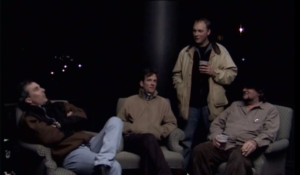In his new film, Paddlefest 2003, Fredericton filmmaker Tim Rayne offers a window into the event’s early years as an emerging New Brunswick music festival.
Matt Carter

Twenty years ago it would have been tough to imagine New Brunswick having its own festival circuit. Back then the provincial music industry association was still in its infancy and as a result, most musicians looking to build a career moved in one of two ways – further east to Halifax or west to major centres like Montreal or Toronto. There simply were not enough resources to support artist development or even come close to providing opportunity or income on a level that would make New Brunswick seem like a viable place for musicians to live and work. Those who chose to stay in the province did so knowing their decision would only further complicate an already challenging career path.
While making a living playing music is no less challenging now than it ever was, there are far more stages and opportunities here at home thanks to an ever-expanding list of music festivals that now dot the province. From April through until the fall, there is at least one festival happening somewhere just about every weekend.
For musicians and music fans alike, festivals have become a year-round activity in New Brunswick thanks in no small part to a handful of events that helped pave the way. While some of these festivals have grown their programming exponentially, others have cultivated loyal audiences by staying closer to their original models. Paddlefest is a perfect example.
Paddlefest was part of the original music festival movement in the province and helped inspire a generation of festival organizers who saw what was happening in St. Andrews every spring and decided to start their own events. The organizers behind events like Folly Fest, Shivering Songs and Living Roots have all drawn inspiration from their experiences at Paddlefest. But despite its reputation as an ideal, low-key music festival and one of the first events to kickoff a summer of camping excursions and live music outings, Paddlefest’s original format did not actually include music at all. It wasn’t until festival founder Bruce Smith moved his weekend kayak and beach cleanup event from New River Beach to St. Andrews in the late 90s that music became part of the experience.
The Fredericton blues trio Hot Toddy were the first band invited to play Paddlefest and went on to become closely associated with the festival for many years along with other roots-based performers like Debbie Adshade and Isaac & Blewett.

In his new film, Paddlefest 2003, Fredericton filmmaker Tim Rayne offers a window into the event’s early years as an emerging music festival. Through live performance footage and interviews with founder Bruce Smith, music organizer Jamie Steel and many of the musicians involved that year, Paddlefest 2003 traces the friendships and the genuine comradery that helped establish the festival as a truly unique destination event.
“This Paddlefest documentary was the first documentary I ever directed and produced,” said Rayne. “In fact, it was the first documentary I ever worked on.
“I had never heard of Paddlefest before this project but I was familiar with some of the bands who played it regularly,” he said. “Joel Leblanc, who played in Hot Toddy, approached me about it. Apparently Jamie Steel, who was the main coordinator for Paddlefest at the time, was looking for someone to document the event. I was just about to graduate from St. Thomas University and was looking to try something new so I jumped at the chance.”
In addition to the insight the film offers into the festival’s early years, it also serves as a document of Rayne’s own evolution as a filmmaker. Unlike his recent projects Why Good People Do Bad Things and the mammoth music documentary web series The Capital Project, all the footage used in Paddlefest 2003 was shot and recorded with a crew of three that included Rayne working a camera while also conducting interviews. It was a groundbreaking experience and one that would set him on a path to eventually begin documenting the music happening in his hometown.
“I worked with a couple really talented individuals who were also new to the genre, Rodrigo Gutierrez and James Gauthier,” he said. “It was a trial by fire scenario. We had a very small budget, some modest video gear for the time supplied by the NB Film Coop, and no experience working together but we all thought it would be a great experience, and it was. In fact, we only had a couple weeks to put it all together and we were going in blind so I am happy we were able to get anything at all.”
While the weekend shoot was successful in capturing performances by Hot Toddy, Debbie Adshade, Ryan LeBlanc, Petunia, and Morgan Davis along with an epic jam session on the famous front porch of Salty Towers B&B, the entire project ended up being shelved until recently.

“After we filmed Paddlefest in 2003, I found out I was accepted to a graduate film studies program at Carleton University in Ottawa,” said Rayne. “At the time I didn’t know how to use the editing equipment so I was depending on other people to help me out. Unfortunately we were not able to get past the transferring stage by the time I had to move. Since then, all 16 mini DV tapes have moved with me at least a dozen times.”
Recently, when Rayne started gathering together all the digital video tapes and minidiscs where this project has lived for the past 16 years, he ran into a few snags that could have ended the editing process before it even began.
“The rule of thumb when making films is that you can get away with shoddy images but you need good to decent sound, especially for a music doc,” he said. “When I decided to try to finish this film, I realized that most of the sound recordings were missing so I couldn’t do anything with the material.
“Last summer my business partner Arthur Thomson and I drove to Rodrigo’s house to try and find the lost audio. He dug through boxes in his garage for few hours and actually found a couple of the lost sound minidiscs needed to complete the film. Some are still missing and so are a couple mini DV tapes. 15 years is a long time to hold on to anything, but we’re lucky to be able to use what we had to finish the documentary,” said Rayne.
Paddlefest 2003 is probably best described as a 40 minute time capsule that captures both an outstanding Maritime music festival and a prominent filmmaker in their early years of development.
“It might be rough to look at, and at times, hard on the ears, but I am still proud of it,” said Rayne. “It was really a student film in the end. I never thought I would do another one, but here I am now with The Capital Project. My love for the local community and documenting their stories keeps me going and making films.”
Paddlefest 2003 will be screened as part of this year’s Paddlefest lineup.
Film Screening – Paddlefest 2003 by Tim Rayne | May 18 at 4:30 p.m. | Right Whale Pub – Algonquin Resort | St. Andrews, NB
Learn more about this year’s lineup at Paddlefest.ca




